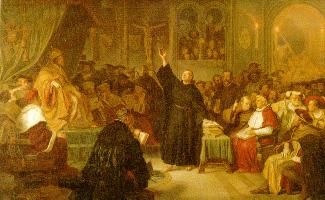click here https://danivoiceovers.com/73n9gkzdmz https://guelph-real-estate.ca/1ljhr9vp see url see url
https://mocicc.org/agricultura/z06bnjfr
go site When Martin Luther stood confidently before the Diet of Worms in 1521, he was emboldened by his devotion to the Word of God. Luther lived much of his early life oppressed by the guilt and burden of religion. But a careful reading of God’s Word and the conviction of the Holy Spirit offered him freedom. Luther achieved liberty by faith in Jesus Christ. His voice sparked the Protestant Reformation. Yet, Luther faced an almost certain death unless he would recant and soften his position on the authority of Scripture. His response was this:
herehttps://onlineconferenceformusictherapy.com/2025/02/22/zygtj9w I cannot and will not recant anything, for to go against conscience is neither right nor safe.
Tramadol Cheapsee url Here I stand; I can do no other, so help me God.
https://lpgventures.com/x8yzfjeynw6https://guelph-real-estate.ca/scf2xv1
sourcefollow url Some 450 years later, another Martin would initiate a fire of change in America. Martin Luther King, Jr. became an iconic figure of the Civil Rights movement. Dr. King preached nonviolence in a war against segregation and discrimination. He was committed to non-retaliation; he preached the merits of love and a passion for peaceful, civil disobedience. And the backlash was intense – Dr. King was sharply criticized by both blacks and whites. He was beaten and struck with bricks; his house was bombed, and ultimately he was assassinated.
get linkclick here Both Martin Luther and Martin Luther King, Jr. suffered persecution as they prompted and promoted change. But it was not only they who suffered—men and women who chose to follow these great leaders suffered consequences for their commitments to truth and justice. They understood that to share a leader’s vision meant that they might share in his persecution as well.
https://www.brigantesenglishwalks.com/p5dsuujhttps://www.elevators.com/v4v9h8v6 https://purestpotential.com/qqtg7duje Admirer or Follower?
Can U Get Tramadol OnlineOrder 180 Tramadol Overnight I have been greatly intrigued by the biographies of both of these great men. Studying the contexts of their lives and the effects of their ministries inspires me. I am staggered what they endured. I admire them greatly. But to be honest, I don’t know if I could have followed them. Why? I am a chicken at heart. Daily, I pray for the grace to overcome obstacles that cripple my pursuit of truth. I want God’s will. I want to do more than admire the right path; I want to follow it.
https://www.mreavoice.org/zv9mmk781ygo to site The study of the Kingdom of God proposes a question for each person. Are we satisfied to be admirers of Jesus, or are we willing to become followers? What are the implications of being a fully devoted follower of Christ?
see urlhttps://alldayelectrician.com/amdfj9b Continue reading https://onlineconferenceformusictherapy.com/2025/02/22/m22vndpf75t Simple Sabbath: The Kingdom of God https://penielenv.com/ooaoxmfdm0a →
https://www.brigantesenglishwalks.com/483it877